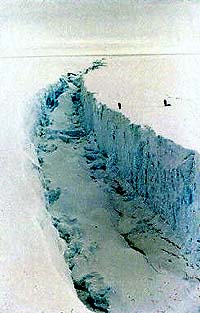| . |  |
. |
 Chinese Scientists Find Meteorites In Antarctica
Chinese Scientists Find Meteorites In AntarcticaBeijing - February 18, 2000 - Ten scientists with the China Research Team discovers and retrieves 28 meteorites in the current Antarctica expedition, Xinhua News Agency reports. According to news from the State Bureau of Oceanography, the meteorites were found at the bottom of a cliff in Grove Mountains. The meteorites were gathered in an area about one square km in size. The exploration team reports that the distribution of meteorites in the area is fairly dense. Some of the larger meteorites collected are almost as heavy as one kilogram. Since these meteorites are sealed in ice over a long period of time, the level of contamination is significantly reduced. In the expedition a year ago, Chinese scientists collected four meteorites in the same area. Liu Xiaohan, a researcher from the Chinese Academy of Sciences who is the leader on both meteorite hunt expeditions, suggests that the area is a new and major meteorite strewn field in Antarctica. The team traveled in snowmobiles and snowshoes, and used metal detectors to assist in their finding. The exploration team will bring the meteorites back to China for detailed analyses in laboratories. Xinhua says that the 3,200 square km areas at Grove Mountains are pristine and mostly unexplored. The location is about 500 km from the Zhongshan ("Middle Mountain") Station, one of the two base stations China has set up on the continent. In addition to the meteorite search, the team also collects samples of rock, soil, ice and air, conducts geological studies, and surveys the area for the production of a topographical map. This is China's 16th science expedition to Antarctica. The China Research Team left the port of Pudong in Shanghai on November 1, 1999 aboard the research ship/icebreaker Xuelong ("Snow Dragon"). In the five-month expedition, the 167 meters long, 20,000-tonne freighter carries some 130 scientists and crewmembers, and scientific equipment on a 45,300 km voyage.
ROBOSPACE
|
| |||||||||
| The content herein, unless otherwise known to be public domain, are Copyright 1995-2016 - Space Media Network. All websites are published in Australia and are solely subject to Australian law and governed by Fair Use principals for news reporting and research purposes. AFP, UPI and IANS news wire stories are copyright Agence France-Presse, United Press International and Indo-Asia News Service. ESA news reports are copyright European Space Agency. All NASA sourced material is public domain. Additional copyrights may apply in whole or part to other bona fide parties. Advertising does not imply endorsement, agreement or approval of any opinions, statements or information provided by Space Media Network on any Web page published or hosted by Space Media Network. Privacy Statement All images and articles appearing on Space Media Network have been edited or digitally altered in some way. Any requests to remove copyright material will be acted upon in a timely and appropriate manner. Any attempt to extort money from Space Media Network will be ignored and reported to Australian Law Enforcement Agencies as a potential case of financial fraud involving the use of a telephonic carriage device or postal service. |